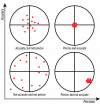Yes, it is significant. That much change so quickly could cause a lot of damage in only 24 hours.
I know you don’t have answers you want... but in our PMs, I previously sent you a solution that will do exactly that. To repeat for people here, test Alk (and calc) more frequently, and do at least 2 tests back to back each time. This will give you insight into the validity of your results, as well as potential causes/issues. So do it. Then let us know the results. Follow the rest of the advice too. It’ll help. The “what-ifs” of your results will provide answers to numerous questions.
As I’ve also stated, don’t make any big changes. Only small changes on occasion, and frequently test your water when doing so. Stopping something cold-Turkey that you do regularly for months is a huge change. Don’t do it blindly. Honestly, you have no way to know how helpful ATI been. But for example, if you stop and then everything dies in 24 hours, then you will have learned the hard way... or... you could just do 2 tests, a few times a week, for 2-3 weeks, learn more about your tank by getting the answers you want, and then make an educated decision.
Thank you. It does help. Andrew had DM’d me but didn’t answer my last post. I have been using the Hanna checker consistently to check dKH. I am very precise in adding water and also in measuring the reagent so I’m relatively certain it isn’t user error. I recently purchased new calcium and magnesium test kits because I wasn’t a fan of the Hanna Calcium checker nor the Red Sea tests. I am now using Seachem kits which were recommended at Pure Reef. The Magnesium kit actually comes with supplies to test the alkalinity as well but I’ve never used it. Do you think that test would be more accurate than the Hanna checker? I could do both at one and compare but how would I know which is correct if I get different results? I really just want to do the right thing although I have to say that things are starting to look better. I’m staring at it now mesmerized by how beautiful everything looks moving in the currents. It’s really just a few pieces I’ve lost. A big red monti that was gorgeous, a stylo and a couple other red monti’s. I have some other SPS corals that are doing fine. I will do your plan. I was also thinking of using the doser to do small daily water changes.I know there has been a bunch of advice on here but this is essentially the same thing I said a few days ago (no harm in the repeat @trizzino). Yes, @NanCrab, you should stop dosing (for now). You have to get a handle on your consumption. Dosing without knowing the consumption isn't going to be productive. Its also something you have to stay on top of because as your corals grow, they will take up more elements. So, if you start a tank with a bunch of 1" frags. You could have your dosing down perfect but if they grow into full colonies, your dosing regimen isn't likely to be sufficient anymore.
So your homework:
1. Tonight: Test your mixed saltwater
2. Tonight: Research your salt mix. Not that you need to change but know what your salt parameters are. Is that what you want your tanks' parameters to be? I chose HW Marinemix because it mixes to a Ca and dKh that I want to keep my tank at. I have a google doc on salt mixes that shows all the listed parameters and price per gallon. I can send that to you if you want
3. Tonight: Water change
4. Tomorrow: At a time that is most convenient, test your tank. Make sure this is a time that would be convenient for the remainder of the week.
5. Sunday: Test you tank
6. Monday: Test your tank
7. Tuesday: Test your tank
8. Wednesday: Test your tank
9. Thursday: Test your tank
10. Thursday: Water Change
11. Thursday: Wait 2 hours post water change, test your tank.
This will give you a baseline for your tank's consumption and let you see how your water changes impact your parameters. You can start to develop a dosing schedule and water change schedule from this small data set. You will likely have to adjust and change as more livestock (fish or coral) is added but this would be a solid baseline. I hope this helps!


